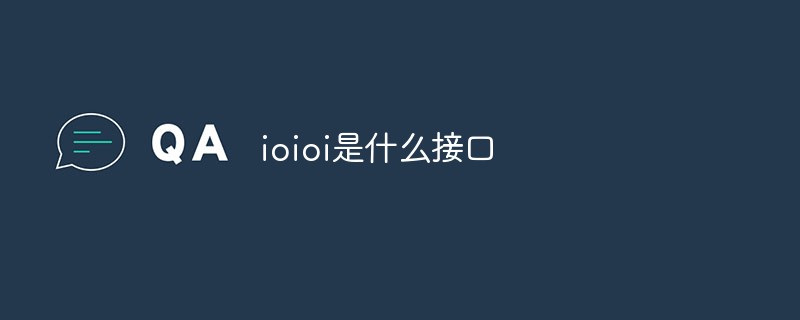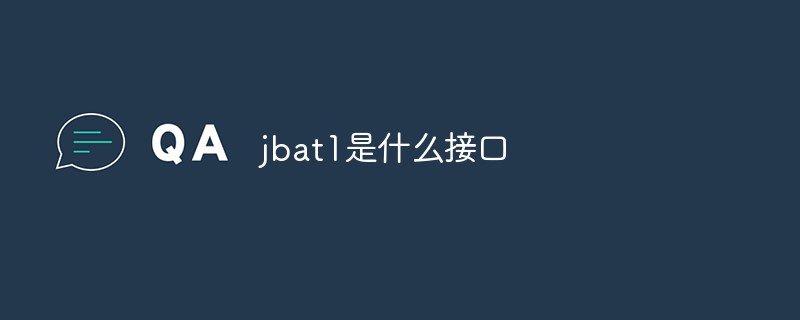 Backend Development
Backend Development PHP Tutorial
PHP Tutorial What is the difference between interfaces and abstract classes in PHP?
What is the difference between interfaces and abstract classes in PHP?Interfaces and abstract classes are used to create extensible PHP code, and there is the following key difference between them: Interfaces enforce through implementation, while abstract classes enforce through inheritance. Interfaces cannot contain concrete methods, while abstract classes can. A class can implement multiple interfaces, but can only inherit from one abstract class. Interfaces cannot be instantiated, but abstract classes can.

Interfaces vs. Abstract Classes in PHP: An In-Depth Comparison
Introduction
Interfaces and abstract classes are powerful tools in PHP for creating extensible and modular code. However, when choosing which one to choose, it is crucial to understand the differences between them. This article will delve into the key features of interfaces and abstract classes and illustrate their differences through practical examples.
Interface
The interface defines a method contract. A class that implements an interface must implement all declared methods but cannot provide their implementations. Interfaces only define method signatures and do not provide any implementation details.
Syntax:
interface IExample {
public function doSomething();
}Abstract class
An abstract class is a partially implemented class that contains abstract methods and concrete method. Abstract methods must be implemented by subclasses derived from the abstract class. Abstract classes provide shared implementation and behavior but still allow subclasses to customize specific methods.
Syntax:
abstract class Example {
public function doSomething() {
// 具体实现
}
abstract public function doSomethingElse();
}Key differences
- Implementation: Interface is implemented by enforced, while abstract classes are enforced through inheritance.
- Concrete methods: Interfaces cannot contain concrete methods, but abstract classes can.
- Multiple inheritance: A class can implement multiple interfaces, but can only inherit from one abstract class.
- Instantiability: Interfaces cannot be instantiated, but abstract classes can.
Practical Case
Consider a simple example where you need to create a drawable shape.
Use interface:
One way is to define an IDrawable interface:
interface IDrawable {
public function draw();
}Then create two classes to implement this Interface:
class Circle implements IDrawable {
public function draw() {
// 绘制圆形的具体实现
}
}
class Square implements IDrawable {
public function draw() {
// 绘制正方形的具体实现
}
}Use abstract class:
Another way is to define an abstract class Shape:
abstract class Shape {
public function draw() {
// 共享的绘制实现
}
abstract public function getArea();
}Then Create two classes that inherit from the abstract class:
class Circle extends Shape {
public function getArea() {
// 计算圆面积的具体实现
}
}
class Square extends Shape {
public function getArea() {
// 计算正方形面积的具体实现
}
}Which approach is more appropriate depends on the specific requirements. If only a drawing contract is needed, an interface is appropriate. If you need to share implementation and concrete methods, abstract classes are a better choice.
The above is the detailed content of What is the difference between interfaces and abstract classes in PHP?. For more information, please follow other related articles on the PHP Chinese website!
 主板aafp是什么接口Aug 29, 2022 am 10:50 AM
主板aafp是什么接口Aug 29, 2022 am 10:50 AM主板上的aafp是音频接口;该接口的功能是启用前面板的“3.5mm”插孔,起到传输音频的作用,aafp跳线基本上由两个部分组成,一部分是固定在主板、硬盘等设备上的,由两根或两根以上金属跳针组成,另一部分是跳线帽,是一个可以活动的组件,外层是绝缘塑料,内层是导电材料,可以插在跳线针上。
 cha fan表示什么风扇Sep 15, 2022 pm 03:09 PM
cha fan表示什么风扇Sep 15, 2022 pm 03:09 PM“cha fan”表示的是机箱风扇;“cha”是“chassis”的缩写,是机箱的意思,“cha fan”接口是主板上的风扇供电接口,用于连接主板与机箱风扇,可以配合温度传感器反馈的信息进行智能的转速调节、控制噪音。
 ioioi是什么接口Aug 31, 2022 pm 04:50 PM
ioioi是什么接口Aug 31, 2022 pm 04:50 PMioioi是指COM接口,即串行通讯端口,简称串口,是采用串行通信方式的扩展接口。COM接口是指数据一位一位地顺序传送;其特点是通信线路简单,只要一对传输线就可以实现双向通信(可以直接利用电话线作为传输线),从而大大降低了成本,特别适用于远距离通信,但传送速度较慢。
 link/act是什么接口Feb 23, 2023 pm 04:14 PM
link/act是什么接口Feb 23, 2023 pm 04:14 PMlink/act是物理数据接口;交换机上的link/act指示灯表示线路是否连接或者活动的状态;通常Link/ACT指示灯用来观察线路是否激活或者通畅;一般情况下,若是线路畅通,则指示灯长亮,若是有数据传送时,则指示灯闪烁。
 jbat1是什么接口Jun 23, 2021 pm 01:38 PM
jbat1是什么接口Jun 23, 2021 pm 01:38 PMjbat1是主板电2113池放电跳线接口,对于现在市面上常见的主板来说,它们都设计有CMOS的放电跳线,让用户在操作时更加便捷,它也因此成为了CMOS最常见的放电方法。
 sata6g是什么接口Sep 14, 2022 am 11:46 AM
sata6g是什么接口Sep 14, 2022 am 11:46 AMsata6g是数据传输速度为“6G/s”的sata接口;sata即“Serial ATA”,也就是串行ATA,是主板接口的名称,现在的硬盘和光驱都使用sata接口与主板相连,这个接口的规格目前已经发展到第三代sata3接口。
 dc接口是什么意思Aug 24, 2022 am 10:47 AM
dc接口是什么意思Aug 24, 2022 am 10:47 AMdc接口是一种为转变输入电压后有效输出固定电压接口的意思;dc接口是由横向插口、纵向插口、绝缘基座、叉形接触弹片、定向键槽组成,两只叉型接触弹片定位在基座中心部位,成纵横向排列互不相连,应用于手机、MP3、数码相机、便携式媒体播放器等产品中。
 鼠标插在主机哪个接口Sep 13, 2022 pm 03:50 PM
鼠标插在主机哪个接口Sep 13, 2022 pm 03:50 PM鼠标插在主机的串口接口、PS/2接口或USB接口上。串行接口是最古老的鼠标接口,是一种9针或25针的D型接口,将鼠标接到电脑主机串口上就能使用。PS/2接口是1987年IBM公司推出的鼠标接口,是一种鼠标和键盘的专用接口,是一种6针的圆型接口。USB接口,是一种高速的通用接口,具有非常高的数据传输率,且支持热插拔。


Hot AI Tools

Undresser.AI Undress
AI-powered app for creating realistic nude photos

AI Clothes Remover
Online AI tool for removing clothes from photos.

Undress AI Tool
Undress images for free

Clothoff.io
AI clothes remover

AI Hentai Generator
Generate AI Hentai for free.

Hot Article

Hot Tools

SublimeText3 Linux new version
SublimeText3 Linux latest version

MinGW - Minimalist GNU for Windows
This project is in the process of being migrated to osdn.net/projects/mingw, you can continue to follow us there. MinGW: A native Windows port of the GNU Compiler Collection (GCC), freely distributable import libraries and header files for building native Windows applications; includes extensions to the MSVC runtime to support C99 functionality. All MinGW software can run on 64-bit Windows platforms.

SAP NetWeaver Server Adapter for Eclipse
Integrate Eclipse with SAP NetWeaver application server.

VSCode Windows 64-bit Download
A free and powerful IDE editor launched by Microsoft

Notepad++7.3.1
Easy-to-use and free code editor





